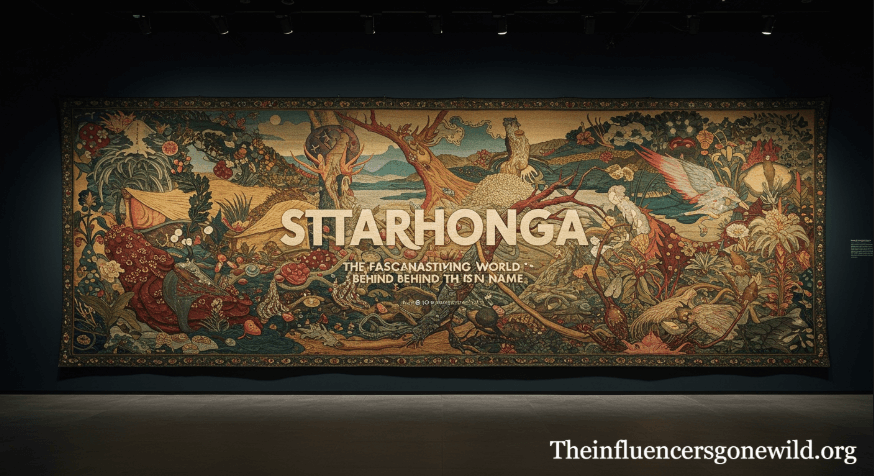Introduction
The digital age has a unique way of elevating certain words and phrases into cultural phenomena. One such word is “starhoonga”.
Whether you’ve encountered it in a meme, music video, personal quote, or conversation, the term carries emotional weight and deep personal meaning for many. But what does it truly signify?
Let’s explore the full spectrum of starhoonga—from its roots and usage to its broader emotional and cultural significance.
What Does Starhoonga Mean?

At its core, starhoonga is a transliteration of the Hindi-Urdu phrase “Star hoon ga,” which means “I will become a star.” It represents ambition, hope, and a future sense of achievement.
It is more than just a phrase; it encapsulates a vision of self-betterment and transformation. Whether you’re a student, artist, athlete, or entrepreneur, starhoonga is a declaration of your intent to shine.
Origin and Evolution of the Word Starhoonga
Historical Context
The use of the phrase can be traced to South Asian pop culture—especially Bollywood and independent music scenes. It may have originated in dialogues or lyrics that express self-assurance and future success.
Internet Adaptation
With social media platforms like Instagram, TikTok, and YouTube becoming central to youth expression, starhoonga gained traction as a self-motivational hashtag and caption.
The Psychology Behind the Word Starhoonga
Why do people resonate with starhoonga so deeply?
Emotional Impact
- Affirmation of Identity: It reassures the speaker of their worth and potential.
- Goal Visualization: Saying “starhoonga” helps in visualizing future success.
- Positive Self-Talk: It reinforces a mindset of growth and belief.
Psychological Insight Table
| Psychological Aspect | Connection to Starhoonga |
| Self-Concept | Enhances personal identity and vision |
| Motivation | Fuels ambition and daily drive |
| Emotional Resilience | Supports optimism during failure |
Starhoonga in Popular Culture
Viral Moments
- Memes: Users often pair starhoonga with dramatic or humorous visuals.
- Quotes: Influencers use it in motivational content to reach youth.
- Short Videos: Platforms like TikTok saw the term become part of transformation videos.
Related Entities
- #StarhoongaChallenge: A viral trend where users share their goals or before-and-after journeys.
- Bollywood Influencers: Celebrities may use this word in interviews or fan interactions.
Starhoonga in Music and Lyrics
In music, words like starhoonga hit a nerve because they are emotionally charged. Several indie musicians have used the phrase in songs to reflect:
- Personal journey
- Rising from failure
- Becoming someone greater
Example Lyric Themes
- “Starhoonga ek din, chhota sa sapna nahi hai” (One day I’ll be a star; it’s not just a small dream)
Starhoonga and Self-Aspiration
Why It Works as a Self-Brand
- Memorable and Simple
- Emotionally Resonant
- Culturally Relatable
Whether you’re building a brand or simply trying to stay motivated, declaring “starhoonga” connects you to your audience and your purpose.
Real-Life Examples of Starhoonga Moments
Case Study 1: Aspiring YouTuber
Ravi, a young creator from Delhi, used #starhoonga in his first video’s description. Two years later, he crossed 100k subscribers and now uses the phrase in his merchandise.
Case Study 2: Sports Aspirant
A young female athlete from Karachi kept a vision board with “Starhoonga” in the center. She went on to represent her city in national championships.
How to Use Starhoonga in Everyday Context
Practical Applications
- As a journal prompt: “What would it take for me to say starhoonga confidently?”
- In goal setting: Attach “starhoonga” to a vision statement.
- In affirmations: Repeat it aloud during morning routines.
Usage Examples
- “I might not be there yet, but starhoonga—I believe it.”
- “They laughed when I started, but starhoonga, you’ll see.”
Comparing Starhoonga with Similar Concepts
| Phrase | Meaning | Emotional Tone |
| Starhoonga | I will become a star | Aspirational |
| I got this | I can handle this moment | Empowering |
| Rise and grind | Consistent daily effort | Hustle |
| Manifesting success | Visualizing future achievement | Spiritual/Trendy |
Expert Insights on the Emotional Pull of Starhoonga
Commentary from a Psychologist
“Words like starhoonga offer powerful emotional triggers because they combine linguistic simplicity with deep hope. It’s a linguistic mirror of inner strength,” says Dr. Mehnaz Khalid, a behavioral psychologist.
Branding Expert Perspective
“If you’re building a personal brand, adopting terms like starhoonga makes your message more relatable. It becomes a catchphrase people remember,” says Naveen Kapoor, a digital strategist.
Why Starhoonga Resonates Across Generations
Although popular among Gen Z, the emotional undertone of starhoonga appeals to:
- Millennials: Relate to its hustle culture vibe
- Gen Alpha: Drawn to self-branding concepts
- Adults: Use it to reflect late-stage career dreams
This makes it a cross-generational term filled with hope, belief, and personal evolution.
Conclusion
The phrase starhoonga is more than linguistic flair—it’s a declaration of self-belief in a world that often challenges one’s sense of worth. Its widespread use shows how a simple expression can unite people across backgrounds and cultures in a shared dream of rising beyond the ordinary.
In saying starhoonga, you’re not just claiming fame or fortune—you’re acknowledging your journey, your struggle, and your unstoppable spirit.
FAQs
What does starhoonga mean?
Starhoonga means “I will become a star.” It’s a motivational phrase often used to express personal ambition and future success.
Is starhoonga a real word?
It’s a transliteration of a Hindi/Urdu phrase. While not a dictionary word in English, it’s widely used in pop culture and social media.
How is starhoonga used?
It’s commonly used in motivational contexts, social media captions, music, personal branding, and self-affirmation.
Why is starhoonga so popular?
Its simplicity, emotional resonance, and relevance to youth culture make it a widely embraced phrase across generations.
Can starhoonga be used in professional settings?
Yes, especially in personal branding or motivational speaking. It’s a strong emotional anchor for storytelling.



